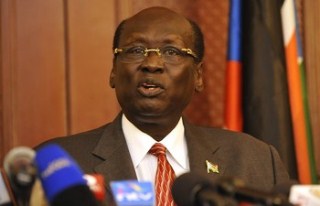Juba calls for “steep” sanctions on Sudan over Abyei
May 20, 2012 (JUBA) – South Sudan on Sunday said it is time the international community imposes “steep sanctions” on the government of neighbouring Sudan for its “deliberate” failure to comply with a UN Security Council (UNSC) resolution calling for an end to hostilities and the immediate withdrawal of troops from the contested region of Abyei.

The UN Interim Security Force for Abyei (UNISFA) was established in June 2011 after Sudanese troops took control of Abyei, displacing tens of thousands of people in the weeks before South Sudan became an independent state.
In the UNSC resolution, the Council welcomed the withdrawal of South Sudanese military and police personnel from Abyei and demanded that Khartoum also redeploy all remaining military and police personnel from Abyei immediately and without preconditions.
Marial said that Khartoum “has not only been making statements rejecting resolution of the Security Council which we have already implemented, but you find that they are not interested in withdrawing troops from Abyei.”
He said Khartoum is placing “illogical and unjustifiable” demands on withdrawing troops from Abyei and conditions to resuming talks over post-independence issues with the intention of “buying time”.
Marial claimed that “our team is ready” for discussions “but we have not heard from them [mediators] what Khartoum has said, instead we are reading from their media unjustified demands.”
Despite Khartoum’s positive talk, Marial claimed it has been carrying out aerial bombardments in areas inside the territories of South Sudan, after the UN issued a resolution on May 2. The resolution demanded the neighbours to cease hostilities with immediate effect and activate Joint Border Verifications Mechanisms (JBVM) and resume talks.
“They have violated all aspects of the resolution of the Security Council. So it is time the global community extends their support to the decision of the UNSC and imposes steep sanctions […] against Khartoum,” said Marial.
He also expressed his disappointment in what he described as the “reluctance” of both the UNSC and the African Union Peace and Security Council (AUPSC) to hold Khartoum responsible for its failure to abide by their demands, instead routinely defying the international community’s calls to withdraw troops from Abyei.
Marial said that his government would be forced to reconsider its position on Abyei.
“We have constitutional obligations and responsibility to protect the lives of our citizens and their properties. The citizens of Abyei are therefore no exception. They have the right to be protected by this government if the UN fails to take action,” he said.
Abyei is a contested region, which was due for a referendum in January 2011 to allow residents to determine whether the area would remain in Sudan or become part of South Sudan.
However, the two sides disagree on with groups have legitimate claims to be considered residents. For this reason and the inability for the Khartoum and Juba to set up the body to implement the vote.
With regards to the traditionally Khartoum-aligned, nomadic Misseriya, who spend part of the year in Abyei, Marial said they, along with “allied militia groups” are “under the command of the Sudanese government in Khartoum to raid villages and take away cattle. They have so far taken over 600 heads of cattle and 195 goats. This happened on the 1, 3 and 10 May.”
Marial added that the people of Abyei and South Sudan are losing faith in the global community, and in the UN in particular, due to the way they have dealt with the conflict between Juba and Khartoum.
(ST)
